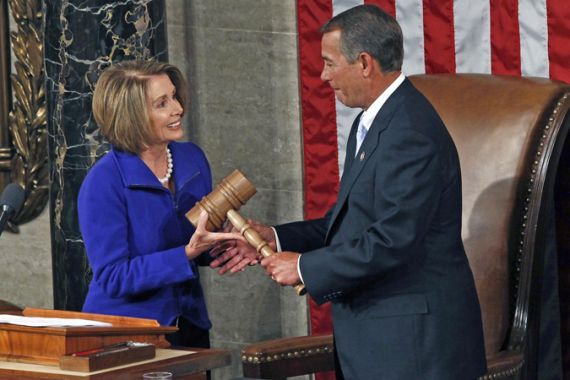Republicans take over US House
Incoming conservatives expected to challenge Democrat president over size of government and how much it spends.

 |
| Boehner, an Ohio Republican, takes up the position of house speaker [Reuters] |
The Republican party has taken charge of the US House of Representatives, with Republican John Boehner, an Ohio congressman, replacing Democrat Nancy Pelosi as house speaker.
Boehner took over the position, the third-highest ranking elected office in the US, on Wednesday, with his party set to clash with Barack Obama, the US president, over the size of government and how much it spends.
Keep reading
list of 4 itemsUS imposes new sanctions on Iran after attack on Israel
A flash flood and a quiet sale highlight India’s Sikkim’s hydro problems
Why is Germany maintaining economic ties with China?
“We gather here today at a time of great challenges,” he said in his inaugural address, citing high unemployment, high health care costs and a growing national debt now at $14 trillion.
“Hard work and tough decisions will be required of the 112th Congress. No longer can we fall short. No longer can we kick the can down the road.
“The people voted to end business as usual, and today we begin carrying out their instructions.”
Boehner has led House Republicans in opposition to Obama’s policies, notably the president’s signature overhaul of US healthcare, which the new speaker has vowed to target with a symbolic repeal vote on January 12.
That move is only a gesture because Democrats still have a majority in the Senate.
Al Jazeera’s Patty Culhane, reporting from Capitol Hill, said that the Republican party will continue to push their agenda of reducing the influence of government.
“They still believe the Democrats, under Obama, have imposed government regulation on the American public, and they have vowed to cut this back,” she said.
“There will be an ongoing struggle to convince the public of just who is right.”
Election gains
The Republicans obtained their 242-193 edge in the House following dramatic gains against the Democrats in elections last November.
Many of the new Republicans harbour connections to the conservative Tea Party movement, and Boehner may struggle at times to keep his caucus unified, especially on contentious matters such as raising the federal debt limit.
The $14.3bn US borrowing limit was last increased in February and the Treasury expects to bump up against that existing threshold in the first or second quarter of 2011.
Analysts worry that failing to raise the debt limit could unnerve financial markets.
Anticipating that conflict, the White House on Wednesday warned Congress against undermining “the full faith and credit” of the US in the debt-limit debate.
“It is important to approach the upcoming vote … on the debt limit in a way that is responsible, and in a way that doesn’t threaten the full faith and credit of our government,” Robert Gibbs, White House spokesman, said.
With the country still mired in a wobbly economic recovery and battered by near 10 per cent unemployment, Obama has said he is counting on Republicans’ hot ideological positions to cool as the congressional session moves forward.
“I’m pretty confident that they’re going to recognise that our job is to govern and make sure that we are delivering jobs for the American people and that we are creating a competitive economy for the 21st century,” Obama said on Tuesday on his return flight from a two-week family holiday in Hawaii.
He said the two sides can build on the final session of the previous Congress late last year, when they agreed on a compromise to prevent income taxes from rising, extend unemployment benefits and enact a cut in taxes paid into the social security pension programme.